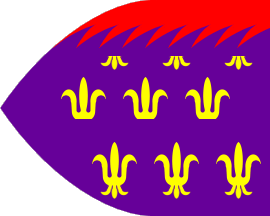
image by Eugene Ipavec, 16 March 2010

Last modified: 2020-12-28 by rob raeside
Keywords: italy | naples | napoli |
Links: FOTW homepage |
search |
disclaimer and copyright |
write us |
mirrors
See also:
Other Sites:

image by Eugene Ipavec, 16 March 2010
The 30th flag mentioned and illustrated in the Book of All
Kingdoms [f0fXX] is attributed to
Naples. This as depicted in the 2005 spanish illustrated
transcription [f0f05], a purple
flag semy of golden fleurs de lis with a red ragged stripe on the
top, shown in the ogival default shape of this source.
The anonymous author of [f0fXX]
describes the flag thusly: "El rey de Napol á por señales
un pendón cárdeno con flores de oro porque’l rey es de la
Casa de Francia. E encima es una lista bermeja que dizen el
restello atal." (The king of Naples has for sign a purple
pendon with golden flowers because the king is from the House of
France. And on top there is a red stripe which they call
"restello" like this).
António Martins-Tuválkin, 17 November 2007
The 1917 National Geographic [gmc17]
says "a red slip which they call a label" (p. 391).
Ned Smith, 17 November 2007
The Hakluyt society has: "The King of Naples has for his
device a purple flag with gold fleurs de lys, for he is of the
House of France, Above is a red slip which they call a label.
The graphic looks like someone found out too late they needed
another line of flowers, rather than an intentional difference in
the depiction. The texts don't speak of different types either.
In all, I'd say all the flowers are supposed to be fleur-de-lys.
Peter Hans van den Muijzenberg, 17 March 2010
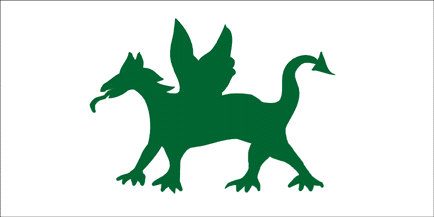
by Jaume Ollé, 25 October 1998
The old Kingdom of Naples used the catalan bars. After 1735 it
was part of Kingdom of Two Sicilies.
This strange ensign is showed in many plates.
Jaume Ollé, 25 October 1998

Jaume Ollé and Jorge Candeias, 7 January 1999
Republic Partenopea was proclaimed
in South Italy (in the territory of Kingdom
of Two Sicilies) in 1799 under french influence (the Borbons
retain Sicily).It was retaken by the Borbons in 1799 and until
1806, when the Kingdon of Naples was created,attribued to Murat.
A white, red and black flag is reported.
According Zigiotto, no evidence of flag exist, and the french
flag is suposed to be in use
Jaume Ollé, 13 October 1998
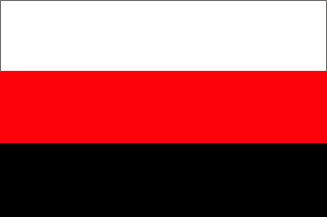
by Jaume Ollé, 25 October 1998
In 1806 Naples was under french ocupation, and the crown was
asigned to Giusepe Bonaparte. A white, red and black horizontal
flag is reported (also quoted as vertical) but Zigiotto suggests
that from the documentation only the use of french flag can be
assured.
Jaume Ollé, 25 October 1998
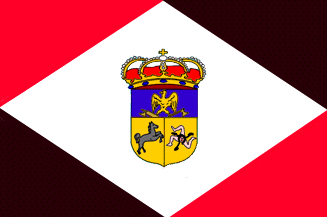
by Jaume Ollé, 25 October 1998
In 1808 Giusepe was called to the Spanish throne and the crown
was assigned to Joachim Murat. A flag with the quoted colours
white, red and black was adopted soon
Jaume Ollé, 25 October 1998
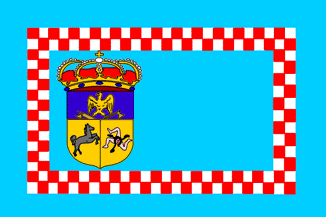
by Jaume Ollé, 25 October 1998
Naples 1811 - blue bordered Red-White or White-Red, with
shield.
Jaume Ollé, 5 June 1997
This flag is the state flag 1811-1815, the civil
ensign was without the arms.
Mario Fabretto, 8 june 1997
In 1811 Murat changed the flag. The new design was clearly
under french influence.
Jaume Ollé, 25 October 1998
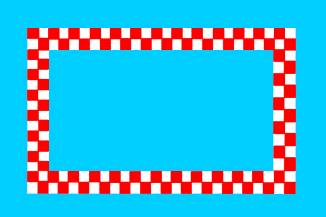
by Jaume Ollé, 25 October 1998
Merchant flag adopted 1811
Jaume Ollé, 25 October 1998
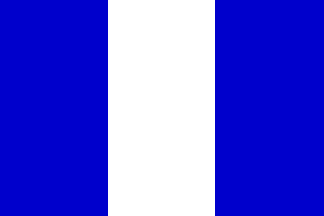
by Phil Nelson , 23 January 2000
Neapolitan signal for a pilot, shown in Colton's Deliniation
of Flags of all Nations (1862), Znamierowski, "The World
Encyclopedia of Flags" , opposite the title page.
Phil Nelson, 23 January 2000
At J.W Norie - J.S. Hobbs: Flaggen aller seefahrenden
Nationen, 1971[ nor71] (original
print 1848):
225 Sicily & Naples Signal for a Pilot - as above and Kingdom of the Two Sicilies - Pilot
Signal, The former is displayed a bit too dark, here, whereas
the latter has the better location, I guess, but like the other
flags on that page has a border on its white edges, though not as
pronounced as some of the others.
Peter Hans van den Muijzenberg, 12 November 2001